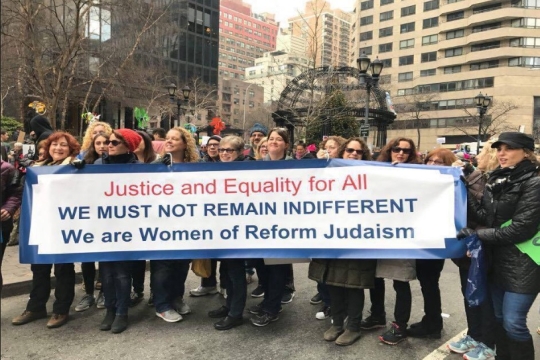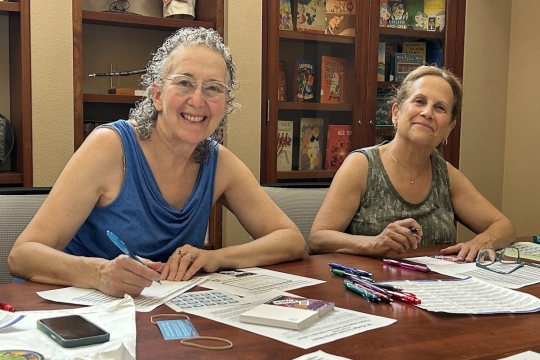
If you could spend an evening with anyone, living or dead, historical or fictional, who would it be and why?
When I applied to my alma mater this question was a required application prompt. Now, four decades later, I’ve thought of it repeatedly, as I face the reality of reproductive rights in our country. Who would I like to spend an evening with? I’d like to have a time-traveling tea with Supreme Court justices Sandra Day O’Connor, Ruth Bader Ginsburg & Amy Coney Barrett.
Dear Sandra & Ruth & Amy:
I write with an invitation. Please join me for tea. Inspired by Judy Chicago’s art installation, "The Dinner Party," I’m inspired to invite you all to a smaller, still beautifully appointed table to discuss a piece of women’s history past and present, namely Roe v. Wade, its impact and the terrifying realities in our country since Roe was overturned by the Supreme Court.
You are three strong women, all mothers, two mothers to daughters. I am a mother, too, of three high-school- and college-age children, two of them girls, who speak for justice, and who fear governmental intrusions on their rights, personal liberties and future, as do I.
If I could sit down for tea with you, I’d love to talk about our lives and our families, about how we’ve balanced our demanding professions and motherhood. And I would bring us to discuss Roe. Why? Well, for one reason, two of you did not toe the expected line on this issue. And one of you has just begun to make her record on the court.
And because I believe in reproductive rights, from the very core of my being. I have been a rabbi for three decades. I am, thus, a teacher and advisor, and have been the recipient of the phone call of a pregnant woman en route to the hospital asking what she should do in a risky pregnancy.
My Jewish tradition (Ruth’s too) provides clear precedent on this issue, rooted in a Hebrew Bible (for Christians, Old Testament) teaching from the book of Exodus where we learn that a pregnant woman is a full life, in Hebrew a nefesh, and the fetus within her is considered like one of her limbs. That is, the rabbis of Jewish history and of the Jewish present, explain that a fetus is not yet a life. Consequently, the mother as a full life takes precedence over the fetus.
Keep in mind that Jewish tradition values life -- we must do anything to save a life. So, if a fetus endangers a mother, physically, emotionally, or in any other way, it is considered a rodef, a pursuer -- one who threatens her life, providing just cause for an abortion. In other words, abortion is not a decision to be taken lightly, but it is an option and there are situations that warrant it.
Now I recognize that the finer points of Jewish law are not what the Supreme Court should be considering to support reproductive rights. For that matter, neither should Christian or Muslim teachings, or those of any other faith be called into account. Nor should anyone’s faith traditions be the battering ram that smashes through Roe or Casey precedents.
But I would hope that you would take into account another small but mighty piece of scripture, the commandment of Deuteronomy, “Justice, justice you shall pursue.” Isn’t justice a primary American value too? It’s embodied in the statue before the Justice Department and throughout our country. Were we having tea and talking, I would urge you to turn to justice in the deliberations of the court.
That justice includes women’s ability to make decisions about their own bodies. That justice is about equal access to healthcare for all – not just those who have privilege and income. That justice is not what we see when we batter through the protections of Roe v. Wade. Again and again, we see that those who are already at risk are endangered the most when access to abortion is threatened and removed, when reproductive rights are taken away.
"Restricting abortion access disproportionately impacts those who are already marginalized in our society: people who are struggling financially; Black, Indigenous, and people of color communities; young people; those in rural communities; immigrants; people living with disabilities; and LGBTQ individuals," according to NCJW's Rabbis For Repro Campaign. "We see that decisions of personal health and reproduction are decisions of justice when minority and marginalized communities bear a disproportionate brunt of the decisions of and legislation in our country." In short, when this happens, we see injustice!
If we were sitting over tea and scones, at this point I’d stand up and get on my proverbial soapbox to emphasize that my faith clearly calls me to act for reproductive choice because reproductive choice is choice for life and justice. Consequently, I challenge the Court and our elected officials to do the same.
How? I would expect each Justice to move beyond self interest to look at the greater good of American citizens. Start at home – imagine if those closest to you did not have access to needed health care. Whatever your personal and principled thoughts are on abortion, I would urge the Court (and our elected officials) to preserve life and to pursue justice. When women have decision-making over their own bodies and access to health care and abortion without fear or governmental interference, we will have life and justice. And when women don’t have access and decision-making power, death occurs, injustice prevails, and our country has failed women, not allowing them to protect themselves.
At this point, no doubt you’d be looking for your lipstick and lifting your napkins after many cups of tea and homemade cookies. Before we said goodbye, though, I’d turn to you. I’d ask Ruth and Sandra to talk about their work on this issue. I’d ask you, Sandra, to talk about your deliberations in the Casey decision in 1992, and the “terrible price” you wrote that we’d pay for overturning Roe. I’d ask you, Ruth, to explain how you wrestled with the legal basis for Roe even as you supported what the decision affirmed. And I’d ask you, Amy, what headlines you want your children to see (with your name attached) as you sit with them over breakfast and drink your morning coffee?
With that I’d thank you for your company and consideration, and tell you that you have an open invitation to join me again at my table.
Sincerely,
Rabbi Lisa S. Greene
Related Posts

A Privilege and A Sacred Duty

Creating a Virtual Sukkah of Peace by Engaging in Social Action

